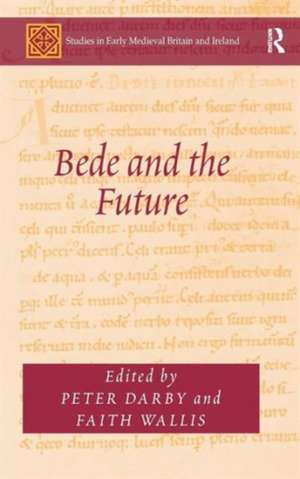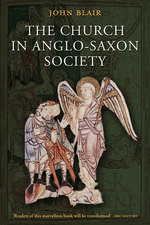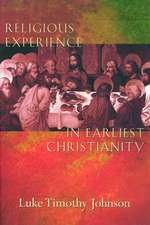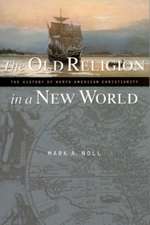Bede and the Future: Studies in Early Medieval Britain and Ireland
Editat de Peter Darby, Faith Wallisen Limba Engleză Hardback – 3 oct 2014
| Toate formatele și edițiile | Preț | Express |
|---|---|---|
| Paperback (1) | 388.13 lei 6-8 săpt. | |
| Taylor & Francis – 30 iun 2020 | 388.13 lei 6-8 săpt. | |
| Hardback (1) | 1062.62 lei 6-8 săpt. | |
| Taylor & Francis – 3 oct 2014 | 1062.62 lei 6-8 săpt. |
Preț: 1062.62 lei
Preț vechi: 1295.88 lei
-18% Nou
Puncte Express: 1594
Preț estimativ în valută:
203.36€ • 211.52$ • 167.88£
203.36€ • 211.52$ • 167.88£
Carte tipărită la comandă
Livrare economică 15-29 aprilie
Preluare comenzi: 021 569.72.76
Specificații
ISBN-13: 9781409451822
ISBN-10: 1409451828
Pagini: 286
Dimensiuni: 156 x 234 x 18 mm
Greutate: 0.68 kg
Ediția:1
Editura: Taylor & Francis
Colecția Routledge
Seria Studies in Early Medieval Britain and Ireland
Locul publicării:Oxford, United Kingdom
ISBN-10: 1409451828
Pagini: 286
Dimensiuni: 156 x 234 x 18 mm
Greutate: 0.68 kg
Ediția:1
Editura: Taylor & Francis
Colecția Routledge
Seria Studies in Early Medieval Britain and Ireland
Locul publicării:Oxford, United Kingdom
Cuprins
Contents: Foreword; Introduction: the many futures of Bede, Peter Darby and Faith Wallis; Why did Bede write a commentary on Revelation?, Faith Wallis; Why did heresy matter to Bede? Present and future contexts, Alan Thacker; Separation anxiety: Bede and threats to Wearmouth and Jarrow, Christopher Grocock; Bede and Islam, Calvin B. Kendall; Bede’s history of the future, Peter Darby; The ends and futures of Bede’s De temporum ratione, James T. Palmer; Christology and the future in Bede’s Annus Domini, MáirÃn Mac Carron; Quae res quem sit habitura finem, posterior aetas videbit: prosperity, adversity and Bede’s hope for the future of Northumbria, Paul C. Hilliard; Visions of reform: Bede’s later writings in context, Scott DeGregorio; Bibliography; Index.
Notă biografică
Peter Darby is Lecturer in Medieval History at the University of Nottingham, having formerly held a British Academy Postdoctoral Fellowship at the University of Leicester. His research interests focus on ecclesiastical history, with a particular emphasis upon Anglo-Saxon England and the writings of Bede. He is the author of Bede and the End of Time (Ashgate, 2012). Faith Wallis is Associate Professor in the Department of History and Classical Studies at McGill University, Montreal. She has written widely on the history of science and medicine and has published translations of Bede’s On the Reckoning of Time, Commentary on Revelation and (with Calvin B. Kendall) On the Nature of Things and on Times.
Recenzii
'These essays ... extensively discuss and analyze Bede’s concerns about the time to come in a variety of contexts. Although Bede himself presents history and eschatology clearly, these related essays show how complex and involved those subjects were and how adroitly Bede treated them as he augmented the fathers’ analyses.' Speculum
Descriere
Bede (c. 673-735) was Anglo-Saxon England's most prominent scholar, and his body of work is among the most important intellectual achievements of the entire Middle Ages. This book brings together a group of international scholars to examine a number of questions about Bede's changing attitudes towards, and ideas about, the short term future (Bede’s own lifetime and the time soon after his death) as well as the end of time.


























